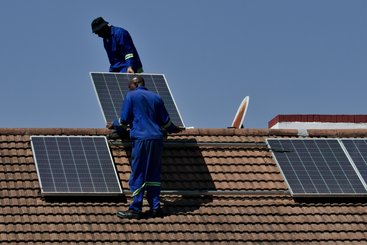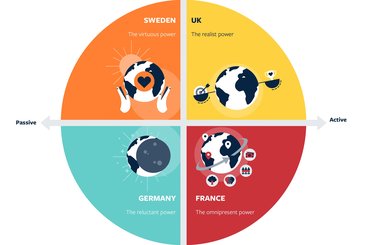Government White Papers on international development are rare things: the last one was published in 2009, and there were only five before that (although various international development strategies have been published in between).
The timing of this White Paper is obviously a bit odd. It is the first published during the 13 years of this Conservative government, and a year before an election that polls predict will be won by the UK’s main opposition Labour Party. And it is only 18 months since the publication of the International Development Strategy, which articulated ‘a new UK approach to international development’. I suspect this also might be the UK’s last White Paper on International Development (but more on that later).
What does the White Paper say?
The White Paper starts by setting out the lack of progress against the Sustainable Development Goals (SDGs), intended to serve as a clarion call for a ‘re-energised international development agenda’. The document commits the UK to a new and expanded ‘clear strategic goal’ where ‘UK international development will work to end extreme poverty, tackle climate change and biodiversity loss’. This goal is seen as aligned with and supportive of the UK’s national interest (a frequently cited but much contested goal).
The main body of the document lists a long set of actions and commitments across six core areas: i) ‘mobilising the money’; ii) international system reform; ii) climate change, biodiversity and economic transformation; iv) ensuring opportunities for all; v) tackling conflict, disasters and food insecurity; and v) harnessing innovation and digital transformation.
The White Paper also promises a shift in tone from the International Development Strategy. The document is punctuated with language around ‘mutually respectful relationships’ and ‘working closely with partners’, in sharp contrast to the previous strategy’s focus on ‘malign actors’. There are also commitments to more equitable partnerships and proposals to do more around localisation and locally-led development.
The White Paper is also much more multilateral in its outlook than the International Development Strategy, where the focus was on building up bilateral investment partnerships. It dedicates a whole section to working with others to reform the multilateral system, including an emphasis on how the UK can champion greater voice for and representation from poorer countries. There is also acknowledgement of the importance of channelling monies through the multilateral system.
The document focuses less on the overall volume of resources and the totemic 0.7 commitment and more on the need to prioritise scarce monies for less well-off countries. It affirms that ‘Poverty reduction is the primary purpose of ODA programmes’, aims ‘to spend at least 50% of all bilateral ODA in the LDCs’ and commits to a floor ‘of providing at least 0.2% of our gross national income (GNI) to LDCs’.
Finally, the White Paper reiterates the need for ‘a whole of UK effort for international development’. It emphasises the importance of the UK’s contributions to development beyond the aid budget – calling for ‘global policy change, a greater role for the private sector, for science and technology’ – and the importance of efforts to ‘mobilise money’ to ‘fill the SDG financing gap’. This is now a world of UKDev rather than UKAid.
What is the White Paper trying to do?
The document’s primary purpose appears to be draw a line under some of the more tubthumping rhetoric on development of the recent past. Aid and development are once again to be celebrated, not denigrated as ‘a giant cash machine in the sky’ or deployed as a means push back against malign actors. The case is made that a focus on ending extreme poverty (alongside climate and biodiversity) is in the UK’s national interest.
The document seems intended to demonstrate that the UK can once again be considered a reliable partner on the international stage. It is clearly much more internationalist in tone in its reaffirmation of the SDGs and the UK’s continued support for working through the multilateral system. Some of the most eye-catching commitments relate to calls for more ambitious reforms of multilateral development banks including commitments to general capital increases. The discussion around the governance of multilateral institutions hints at potential support for reconsideration of issues such as quotas and shareholdings.
The White Paper, and the extensive consultation during its preparation, will likely ease some of the concerns of the UK development sector. Given the exhaustive list of actions, many people who submitted evidence will feel they have been listened to. The focus on poverty and climate will land well even if a return to 0.7 remains out of sight.
The paper also provides a useful stock-take for the Labour Party. It provides an exhaustive list of the (typically multi-year) initiatives and projects that a Labour government would inherit if it were to win the next election. There are unlikely to be many individual actions or commitments in there that an incoming government could strongly disagree with, but given the long lists of commitments (more than 200), it also provides a useful base for thinking about what a Labour government might want to do less of.
Why the White Paper might not achieve what it sets out to do
The White Paper reads like a (revised) visioning document for the UK’s international development work. It is, however, much less clear on the obstacles or what might have to change to enable the achievement of that vision. Here are five areas for further consideration and reflection.
1. On the new strategic goal and an organising framework for the FCDO’s work
The revised strategic goal for development clearly harks back to the days of DFID. In the 1990s, the same focus on poverty reduction guided DFID’s work and its use of public money. It is less clear from the White Paper how this focus could be operationalised in today’s integrated foreign ministry structure. What domain of actions does this new goal guide? The strategy is about more than aid and the paper talks a great deal about ‘UK international development’, but what is in scope for this thing? Where does the focus on extreme poverty start and stop?
Another operational consideration is how these kinds of high-level top-down objectives marry with the idea of respectful and equitable partnerships. What does the UK do if the priorities of a sovereign government differ? What happens if a partner government’s core priority is to support job creation for the middle classes rather than focusing efforts on the extreme poor? Is that not of interest to the UK’s development agenda? Will the UK walk away from a country if a government chooses to cut down its forests to expand land use for agriculture?
The dual goal of ending extreme poverty and tackling climate change also raises questions around the UK’s role in countries where poverty persists even if ‘extreme poverty’ is largely a problem of the past. Are UK efforts in such geographies limited to climate and biodiversity? Does ‘UK international development’ still have a role to play in countries like South Africa?
2. On cross-government coordination and a ‘whole of UK approach’
The White Paper rightly makes the case that what the UK does has impacts on development beyond the aid budget and calls for a ‘whole of government’ and ‘whole of UK approach’. Details on how this will materialise are however scant. Typically, responsibilities for coordination of cross-governmental endeavours lie with the Prime Minister’s Office, the Cabinet Office and the Treasury. What levers, mandate or structure does the FCDO have to coordinate actions across government, let alone across society as a whole? Who is responsible for bringing UKDev together, especially outside of direct aid spending?
The UK’s policies on a wide range of issues, from migration to defence and vaccine procurement, also matter for poverty and climate, but are led by departments with motivations and objectives that do not necessarily align with the focus of ‘UKDev’. Is there a whole of government approach to bring greater consistency in other policy areas? How might the FCDO need to adapt to domestic actions so that it is not perceived as an island of idealism adrift from the core business of government?
3. On resource allocation
The White Paper makes some quite specific commitments around how ODA will be used (with the primary purpose of poverty reduction) and where it will be prioritised (with over half spent in LDCs). It is not however clear that it is in the gift of the FCDO to actually see these commitments met.
Any plan for resource allocation needs to look beyond stated priorities and revisit institutional incentives. Specifically, the incentive to maximise the reported quantum of ODA (given the pressure to meet certain input targets) at minimal fiscal cost (given the overall stance of UK fiscal policy) will likely continue to shape resource allocation absent any institutional changes. If organisations like the BBC World Service are still under pressure to ensure their spending can be recorded as ODA, why would we (or indeed should we) expect the primary purpose of their work to be poverty reduction? If the costs of hosting refugees rise in a given year, will the expectation still be that the FCDO finds corresponding savings? What has changed?
4. On ‘mobilising the money’
The White Paper places a strong emphasis on mobilising private capital to ‘fill an SDG financing gap’. This is not a new agenda and has been a key area of focus for many international organisations since the financing for development agenda in Addis in 2015. At that time, global conditions were much more conducive to enabling cross-border investments (including lower global interest rates and lower levels of indebtedness), but this mobilisation agenda fell short of expectations. Many of the ideas presented suggest that the barriers to the mobilisation of private capital relate to insufficient financial innovation in the UK’s private sector. This at least merits further scrutiny.
Andrew Mitchell has stated that, by 2030, British Investment International will be investing half its budget in lower-income countries. Again, it is not clear in the White Paper what are understood as the key barriers preventing this from happening now. Do they now? Doesrelate to how BII is financed? Its operational model? What would need to change to make this happen?
5. On humility
Any kind of meaningful social change is difficult. Domestically the UK is struggling to make progress on addressing its own challenges with respect to poverty reduction, reform of public service provision, economic productivity and the carbon intensity of production. Against that background, it is hard not to see as grandiose the White Paper’s stated ambitions to ‘end extreme poverty, tackle climate change and biodiversity loss and achieve the SDGs’ everywhere else. It is telling that the White Paper on Levelling Up devoted more than 300 pages to addressing regional inequalities in the UK, while the International Development White Paper explains how the UK is going to help fix the world in around 150 pages.
This is not to say that the UK should be inward-looking or despondent on questions of global poverty, but it does perhaps call for more humility, consideration and respect regarding how the UK approaches some of the drivers of persistent poverty. The road to humility and respectful partnership is about much more than localising aid delivery: it will require addressing the barriers preventing the UK from building deep expertise and finding ways to steer predictable effort over the longer term.
In conclusion
Andrew Mitchell and the authors deserve credit for starting a much-needed, more reflective conversation about how a mid-sized power like the UK can play a useful role in today’s world. At the outset, I predicted this will be the last White Paper on International Development: I believe this because the problem statement for such a piece is unhelpfully large and impossibly ambitious.
Indeed, perhaps the biggest question the White paper raises is what any future government might not want to do on international development, and how the UK’s institutions would need to adapt to support a more humble and consistent set of ambitions.



